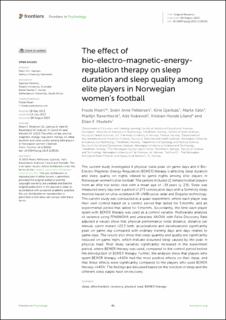The effect of bio-electro-magnetic-energyregulation therapy on sleep duration and sleep quality among elite players in Norwegian women’s football
Moen, Frode; Pettersen, Svein Arne; Gjertsås, Kine; Vatn, Marte; Ravenhorst, Martijn; Kvålsvoll, Atle Sturla; Liland, Kristian Hovde; Mosleth, Ellen Færgestad
Peer reviewed, Journal article
Published version
Permanent lenke
https://hdl.handle.net/11250/3085667Utgivelsesdato
2023Metadata
Vis full innførselSamlinger
Sammendrag
The current study investigated if physical loads peak on game days and if Bio- Electro-Magnetic-Energy-Regulation (BEMER) therapy is affecting sleep duration and sleep quality on nights related to game nights among elite players in Norwegian women’s elite football. The sample included 21 female football players from an elite top series club with a mean age of ~24 years (± 2.8). Sleep was measured every day over a period of 273 consecutive days with a Somnofy sleep monitor based on ultra-wideband (IR-UWB) pulse radar and Doppler technology. The current study was conducted as a quasi-experiment, where each player was their own control based on a control period that lasted for 3 months, and an experimental period that lasted for 5 months. Accordantly, the time each player spent with BEMER therapy was used as a control variable. Multivariate analyses of variance using FFMANOVA and univariate ANOVA with False Discovery Rate adjusted p-values show that physical performance (total distance, distance per minute, sprint meters >22.5 kmh, accelerations and decelerations) significantly peak on game day compared with ordinary training days and days related to game days. The results also show that sleep quantity and quality are significantly reduced on game night, which indicate disturbed sleep caused by the peak in physical load. Most sleep variables significantly increased in the experiment period, where BEMER therapy was used, compared to the control period before the introduction of BEMER therapy. Further, the analyses show that players who spent BEMER therapy >440 h had the most positive effects on their sleep, and that these effects were significantly compared to the players who used BEMER therapy <440 h. The findings are discussed based on the function of sleep and the different sleep stages have on recovery.

